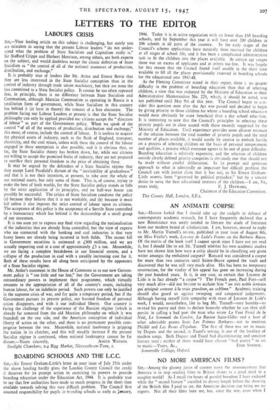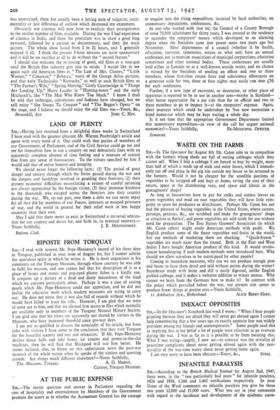NO MORE AMERICAN FILMS ?
Sm,—Among the gloomy items of current news the announcement that America is to stop sending films to Britain shines as a good deed in a naughty world! As I recall the hours of painful boredom I have endured while the "second feature" uncoiled its dreary length before the showing of the British film I paid to see, the American decision can bring me no regrets. Not all their films bore me, but, since the war, even when I was entertained, there has usually been a jarring note of vulgarity, senti- mentality or just difference of outlook which destroyed my enjoyment.
Obviously our cinemas will now have to'readjust their arrangements to the smaller number of films available. During the war I had experience of cinemas in India, and there the procedure was to show a good long newsreel, followed by a cartoon or documentary, and then the main picture. The whole show lasted from 2 to 21 hours, and I generally enjoyed it all. I think the present 3-hour sessions are quite unnecessary and it will be no sacrifice at all to do without the " second feature."
I should also welcome the re-issuing of good, old films as a stop-gap until the British film industry gets into its stride. I would like to see again such old American films as " The Last of Mrs. Chaney," " Little Women," " Cimarron," " Rebecca," many of the George Arliss pictures, and that early Technicolor " Kentucky," as well as such British films as " The Farmer's Wife," " Spring Meeting," Cicely Courtneidge in " Things Are Looking Up," Harry Lauder in " Hunting-tower " and the early Hitchcock's, like " The Man Who Knew Too Much." I know I shall be told that technique, conventions and fashions have changed, but we still enjoy " She Stoops To Conquer " and " The Beggar's Opera " on the stage, and I believe we should enjoy the old films too.—Yours, &c.,



































 Previous page
Previous page